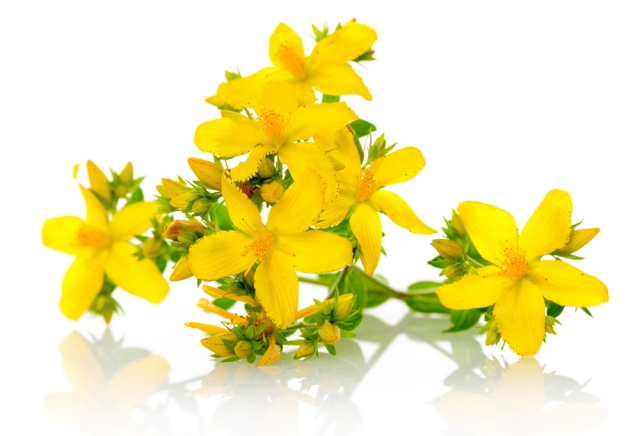
St. John’s wort (Hypericum perforatum L., Clusiaceae) is one of the world’s best-researched phytomedicines. It is a shrubby perennial plant with bright yellow flowers. St. John’s wort was named because the flowers were said to bloom for the first time around June 24, the birthday of St. John the Baptist.
- It is equivalent to best selling anti-depressant with fewer and less serious side effects. According to a new German study, when treating patients with mild to moderate depression, hypericum (in the form of St. John’s wort Ze 117 extract tablet) should be considered as one of the first treatment options based upon both efficacy and safety, particularly in cases where treatment is a choice between fluoxetine and hypericum.
- St. John’s wort (Hypericum perforatum L., Clusiaceae) has been shown to be effective in alleviating symptoms of tiredness and fatigue in depressed patients (Hübner et al., 1993) After two weeks of treatment with standardized St. John’s wort extract, subjects’ perceived fatigue was significantly less than that recorded at baseline. After six weeks, fatigue was reduced significantly further.
- Numerous studies have shown that St. John’s wort (Hypericum perforatum L., Clusiaceae) is effective in alleviating mild to moderate depression, possibly via effects on the brain’s uptake of the neurotransmitter serotonin. Recently, studies have shown that serotonin-reuptake inhibitors (SRI) antidepressant drugs (including clomipramine, fluoxetine, fluvoxamine, paroxetine, and sertraline) are effective against OCD, leading researchers to speculate about the potential of SJW as a new treatment for the condition.
- While depression is one symptom of menopause that St. John’s wort (SJW) might be expected to improve, German researchers designed a trial to assess its effects on other problems more specific to menopause (Grube, et al., 2000). Their results suggest that SJW not only helps relieve psychological and physical symptoms, but also helps enhance sexual well-being for menopausal women. Specifically, 76 percent of study participants experienced a statistically significant lessening or disappearance of symptoms after 12 weeks of treatment with SJW, and participating physicians observed improvement in 79 percent. Responses to the Sexuality Assessment questionnaire showed that patients felt more physically attractive, saw sexual intercourse as more valuable, and were more likely to initiate sex at the end of treatment than they had before taking SJW.
- Oil of St. John’s wort, applied to the skin, was a folk remedy for skin injuries, nerve pain, burns and hemorrhoids.
Note: Pregnant or breastfeeding women, and those trying to conceive, should avoid St. John’s wort
Cautions and Side Effects
Do not use when pregnant or breastfeeding. Can make skin light-sensitive so wear sunscreen and don’t sunbathe. Check with your doctor before taking any medication with St John’s Wort as it reacts with many drugs including oral contraceptives; theophylline, digoxin; medications for HIV; tamoxifen; prescribed antidepressants, alcohol and over-the-counter cold cures. May cause high blood pressure if taken with ephedra compounds. Do not use to self-treat clinical depression; this is a serious condition requiring a doctor’s help.